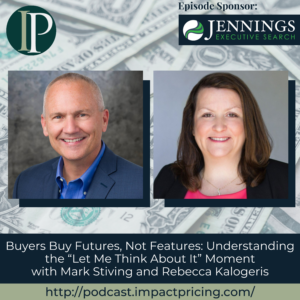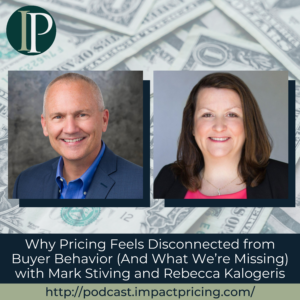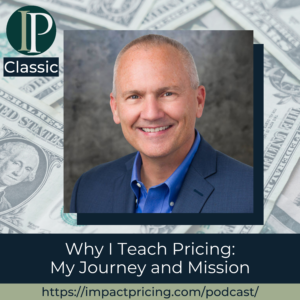David Newman specializes in working with speakers, authors, consultants, and independent professionals who want to stop throwing money into a marketing black hole and attract, engage, and win more clients. He’s been running his own business called Do It Marketing for 18 years. He earned his CSP, Certified Speaking Professional from National Speakers Association. David hosts his own podcast called The Speaking Show.
In this episode, David will walk us through the ideas and strategies of charging a premium price for your product and services.
In his vast experience as a speaker and consultant to various big firms in different industries and to solopreneurs, be assured he will share the relevant pricing tactics of reinforcing that psychological perception of premium products and services.
Podcast: Play in new window | Download
Why you have to check out today’s podcast:
- Why you should charge a premium fee for your services
- Why undercharging is killing your business
- The halo effect of premium pricing: How to use it for your business
“You have to charge premium fees before you think you are ready to charge premium fees. Your pricing is your positioning. And your positioning is integrated into your pricing. ”
– David Newman
Stay updated on all thing pricing.
Subscribe to ‘The Pricing Perspective’ here
Topics Covered:
01:44 – Relating his transition from being a corporate consultant to helping other speakers raise their game
03:33 – The feeling of fulfillment seeing his clients reach their goals
04:43 – His thought on ignorance and undercharging your services
08:12 – Why do people hire speakers? Is it for content or delivery?
12:21 – Influence and Differentiation in a pricing frame of mind
14:51 – How much should you price your service as a speaker
18:54 – The halo effect of premium pricing: How to use it for your business
19:48 – On pricing less than what you are really worth
23:47 – The value of premium pricing
25:31 – Pricing advice from David: “People buy who they are, they really buy who they are. There are passengers on an airplane that always fly economy, would never think of business class or first class because it doesn’t match their identity. It’s not who they are.”
Key Takeaways:
“The more research that you do about what’s the going rate in your market, in your topic for your level of expertise, you will be shocked. You’ll be shocked and stunned about how much you should be getting. Because we always underprice ourselves and we always overestimate the value that others deliver.” – David Newman
“When people pay more, they pay more attention. They value your product more just because they paid more and then they implement more and then they get more results.” – David Newman
“When you’re not offering something at a premium price, I guarantee you that you’re leaving money on the table. People that want the biggest, the best and the most expensive, if they don’t see it with you, they’re going to go find it with somebody else. ” – David Newman
Connect with David Newman:
Connect with Mark Stiving
Full Interview Transcript
(Note: This transcript was created using Temi, an AI transcription service. Please forgive any transcription or grammatical errors. We probably sounded better in real life.)
David Newman: You got to charge premium fees before you think you’re ready to charge premium fees. One of the first things they will tell you is your pricing is your positioning and your positioning is integrated into your pricing.
[Podcast Intro]
Mark Stiving: Welcome to Impact Pricing, the podcast where we discuss pricing, value and hopefully the relationship between the two. I’m Mark Stiving and today, our guest is David Newman. Here are three things you absolutely want to know about David, before we start. He’s been running his own business called Do It Marketing for 18 years. He’s a business coach for speakers and I took one of his courses a year or so ago. He’s a speaker himself. He earned his CSP, Certified Speaking Professional. You can think of that as the Eagle Scout of Speaking from National Speakers Association and he hosts his own podcast called, The Speaking Show. I have listened to all 85 episodes and they are awesome. Welcome, David.
David Newman:Hey Mark, great to be here.
David Newman: am so excited to have you on. Normally I interview other pricing experts and today I’m talking with a market expert. We’re gonna talk about the market and how you actually do your job.
David Newman:Yes.
David Newman: Let’s start a little history though. How or why did you move from speaking to helping speakers?
David Newman:It was a real organic process. So I had my own speaking training and consulting business since 2001 and along the course there, I made every mistake in the book. I made the good ones twice. I finally started to get this dialed in and other speakers and consultants were saying, “Well, David, can I pick your brain?” “Can I take you to lunch?” “Can I buy you coffee?” “Can I buy you dinner?” So I had a lot of coffee, lunch, breakfast, and dinner with these folks. No money changed hands. And then one day, a career consultant friend of mine, who’s still a friend to this day says to me, you should do this professionally. You should do this full time. I said, “I should do what full time?” “Usually just help other independent professionals and speakers and consultants just like you.” I said, “That’s a stupid idea. I’m not doing that. All those people are broke. I’m going back to my big corporate clients, QVC, Microsoft, IBM, Vanguard, I’m, you know, no way.” And he says to me, “Listen, you can either be awesome as a corporate consultant or you can be awesome and help other experts and consultants. It’s your choice. You’re going to be an awesome professional. Either way. I’m just saying that you might have a lot more fun doing it with the small and solo thought-leading experts.”And I thought about that and that was such a profound turnaround in my thinking, it’s around 2007 2008, that I did in fact start to pivot my business. And I started small. I started to kind of a side thing to my main corporate speaking and consulting. But within three years, by 2010 I had basically dedicated myself 100% to helping speakers, authors, consultants, and coaches raise their game. And the way I started this, Mark, I started by creating the program that I wish I myself had had access to 10 years prior.
Mark Stiving: That’s the way it almost always works. And you know what’s funny is if you ask a, you do a big corporate gig, you actually have a big impact on a big corporation. A VP is not going to come to you heartfeltly and say, “David, thank you so much.”
David Newman: It’s true
Mark Stiving: You take a solopreneur and you make it so that they’ve doubled their income in a year. Oh my gosh. The gratitude that you get and you make money too. But the gratitude and the good feelings are just amazing.
David Newman:That I would say is the best part of doing this work. You can make a little tiny dent, like you said, Mark, and a big giant corporation, but you can literally change a solo business owner’s life, career, marriage, bank account, future retirement, etcetera. Yeah
Mark Stiving:Okay. Quickly, there’s a rule in NSA, I don’t know if it’s written or not written, but we never talk about prices.
David Newman:Yeah, but we’re not an NSA.
Mark Stiving: Yeah, exactly. That’s a rule that I ignore always because it’s the only thing I talk about.
David Newman:There you go.
Mark Stiving: So let’s start with a pricing question for you. What’s the biggest pricing problem that you think your clients face?
David Newman: Undercharging. Undercharging, and I’m also going to say ignorance. There are way too… and this is across any sort of thought, leading business coach, consultant, speaker, trainer. People are unaware of the going market rate for speakers, authors, coaches, consultants, even when we show them the “going market rate,” “average rate,” whatever you want to call it. Like, oh, that’s for other people. You know, I’m not good enough. I’m not smart enough. I’m just starting out. So one of the dumbest questions, that’s a total beautiful pricing question that I get all the time. “David, what’s a good rate? What’s a good fee for a speaker just starting out?” Now, I will get that question from a 40-year-old speaker, a 60-year-old speaker, and a 73-year-old speaker, and my argument, Mark, is that none of those three speakers are “just starting out”. They’re bringing anywhere from 20 to 50 years of hard-won expertise, experience, battle scars, lessons learned to the table. Even if it’s their first paid speech that should be proudly attended to $15,000 program because they shouldn’t compare themselves to like, well, I’m doing a time management class for the first time I guess I’ll charge $1,200. You know a former CEO, a former CMO, a former VP of Finance. The first their “first speech.” Trust me, they are not going, I’m just going to charge $300 any entrepreneur that goes out, well, I’m not worthy yet. I have to write my book, I have to write my second book. I have to get my third Ph.D. I have to have my 17,000th hour of sample coaching before I’m ready. My pricing advice, my friends, and this is from a layman’s term, nonpricing expert reporting for duty. You got to charge premium fees before you think you’re ready to charge premium fees because Mark and all of his smart friends that were on this podcast before me, one of the first things they will tell you is your pricing is your positioning and your positioning is integrated into your pricing. If someone dropped off a Ferrari on your front lawn and said, hey, I’ll give this to you for $10,000 your first question would be, what’s wrong with the car? You don’t want someone thinking about you as a speaker. What’s wrong with that guy? Why is he charging so little? Why is he so cheap? Is it going to show up drunk, show up late, starts swearing a blue streak, start grabbing my staff and making inappropriate comments? Is this guy walking, talking liability on a lawsuit? Because otherwise you should be charging at least x, but he’s charging one-third of x. There must be something wrong.
Mark Stiving: Half of what you just said I’ve never thought about, but let’s take an expert for a second. They’ve been working in the industry forever. There are CMO, they come out, maybe it’s their first paid speech and you could take the speech and break it up into two chunks. You can say, here’s the delivery, here’s the content. Guess what? Content-wise, they’re worth a ton. They’re probably decent at delivery too, but the content is just, do you think that people who are hiring speakers are buying content or buying delivery? Obviously, they’re buying both, but
David Newman: I’m going to give you the third slice on that. I don’t think they’re buying either, because content, no matter how great, no matter how brilliant information is a commodity. If you wanted information, you would go to Google. If you wanted information, you would go to thousands of blogs or thousands of Youtube channels. If you want to delivery, you know, you would hire a juggler or a musician. You’d get James Taylor to come and do a concert at your big association event. What they’re really buying is, they’re buying insight. They’re buying insight, they’re buying your personal recommendation. Opinion, biases, slant information as a commodity. Insight is priceless, no pun intended here on the pricing podcast of course, but what people really want and what I think as thought leaders, it’s our job to provide is what are your peers, what are other experts and executives like you unwilling to say unable to say or actually afraid to say that is true in your industry about your topic. Maybe it’s contrarian, maybe it’s risky. Maybe it’s that kind of rebel, rebellious point of view. But you have to have something different, distinct contrarian and that will stand out from all the noise. Even if that’s your turn of phrase, the way you talk about people. I mean a great pricing moniker, which I never thought of as a pricing moniker until now, Mark, I see people that can’t afford what you do are broke ass losers. And I called the broke ass losers. I don’t say people that can’t afford your fee, uh, people that can’t afford your rate. I shouted loud and proud on every webinar, every video, every live presentation that I do. I say, listen, there’s a segment of the market that is not going to pay your price. We call them broke ass losers, tire kickers, goofballs, price shoppers, people that you don’t want to spend a single second with. Now some people say, oh, he’s so mean. He just called them a broke ass loser, but I want people to relieve that meeting and for months and months and years and years look at each other and say, well, we don’t want to hire that. We don’t want to hire this guy’s a broke ass loser. We don’t want to serve that client. That client’s a broke ass loser. I want to infect their brain waves with my proprietary words, methodology, opinions, and insight. I don’t want to say, you know, Oh, just work with people who can afford your fee. Every other more on is saying you can just work with people that can afford your fee. I say when you see a broke ass loser, you run the other way and do everything you can to filter out the broke ass losers, the goofballs, the tire kickers, the window shoppers. People remember that because it sticks.
Mark Stiving: I can just sit here and listen to you talk forever, David. I enjoy this. Two thoughts that come to mind off of what you just said. First off, you said to influence or you said insights.
David Newman: Yes.
Mark Stiving: And notice that insight isn’t delivery…
David Newman: Correct.
Mark Stiving: Therefore someone coming out of a CMO’s job has insight. They could do that right now, second…
David Newman: Insight and opinion and recommendation and their personal bias on slant.
Mark Stiving: The second thing that you said, you actually didn’t say it, but your description described it and that is you really want influence. You want to be able to influence the audience, influence the customers, and you do that with the right words, the right phrases, the things that are going to stick in their mind.
David Newman: Yes.
Mark Stiving: I thought that was brilliant and if I take all this and turn it into a pricing frame of mind, that influence is truly differentiation. It’s how is David Newman different from somebody else? How is it that you’re going to make an audience changed their way of thinking where someone else is just going to give them information? You know, I’m an information guy. I don’t change people’s minds.
David Newman: Well, I’m going to disagree because remember my, in my model, there are three different speaker value propositions. There’s the performer, there’s a teacher and there’s a catalyst. So you and I were not performers, necessarily. We’re not. In other words, even if we perform well, we’re not hired for the show, were not hired for the performance. We’re hired for content like you said. So that’s the teacher model and when you provoked someone’s thinking, Mark and they’d go home and they say, you know what? We may be doing our pricing the wrong way or we may want to add a wrinkle or a new level to our pricing strategy. Now you’re a catalyst and I think everyone needs to know where they fall on that spectrum of, are you hired primarily as a performer? Are you hired primarily as a teacher? Meaning you’re conveying content, in a way that’s intriguing and different and sticky, or are you a catalyst where you’re actually, you’ll making change happen in that audience either right there in the room or soon after they go home? One of the biggest compliments that I’ve, I’ve gotten, and sometimes we talk about web marketing and headlines and marketing copy, and so people come up to me after a program, M ark, they say, I had my laptop open, I was making changes to my website as you were talking. That is a catalyst statement. I said something about here’s what you should have on your website. Here’s what you should never have on your website. And this person opened the laptop, logged into their web server, tap, tap, tap, hit save, hit publish, hit the send button, even over bad hotel Wifi. And they were making changes in the ballroom.
Mark Stiving: Nice. That’s actually having an impact right on the spot. Absolutely love that. Early on in our conversation, you brought up the fact that people who are just coming into the speaking world, regardless of their level of expertise, don’t understand what the market would pay essentially. They don’t understand their value. And I told you this story on your podcast. I’m gonna say it again. I don’t think I’ve ever said it on my own podcast, but when I first wrote my book, somebody called and said, hey, would you give a speech? I said yes. And they said, how much do you charge? And I had no idea how to figure that out. And this has gotta be the hardest thing in the world for someone who, who doesn’t know a marketplace to figure out what price should I charge, how do you answer that? Or how does someone figure that out? I, by the way, the information you give your students is phenomenal. But how do, how do you figure this out?
David Newman: Thank you. Thank you. Thank you. Well, think about it. I want to go to a different world of pricing, which is commodity pricing, which of course as speakers and experts, we really try and stay away from, let’s say that you genetically engineer the world’s greatest banana. If you don’t study banana prices and what do cheap bananas go for, what two American bananas, California bananas, Mexican bananas, Dominican Republic bananas, if you don’t know what a Bushel of bananas goes for, you’ve got no point of reference. Am I coming in cheap? Am I coming in middle? Am I coming in high? Am I coming in super premium? At the top of the market with my new genetically engineered super duper banana with a guaranteed nonslip banana peel you would have no point of reference. So I think the first thing people need to do to answer your question, which is, well, how much should I charge? What’s the going rate, Is do a competitive scan and you have to really be a student of the game. I figure out what are other experts and executives charging and getting for similar content at similar venues where you want to present. Now I’m always a believer in premium pricing that you want to be at least you know you don’t want to be near the bottom. You don’t want to be in the kind of the middle, the average. You want to be kind of upper middle class. You want to be somewhere between a Lexus, A, you know, high-end Lexus and a low-end Mercedes. You don’t need to be crazy. We’re not going to do Rolls Royce pricing and you know $400,000 advance, but you want to be in speaker terms. You want to be somewhere between that nice Lexus and that entry-level Mercedes. What that means to you and me, because we’re not an NSA, is somewhere between five and $10,000 that’s kind of the beginning baseline. Notice I said beginning, and notice I said baseline. Now when people come into our program, Mark that you’ve been through, they do a competitive scan like, oh my God, no one’s making less than $12,000 why am I charging five grand? And they literally say, I’ve found this person. They’re no better than me. There are no smarter than me. They have a self-published book. I have a traditionally published book. They’ve been doing this for five years. I’ve been doing this for eight years. This person’s getting in charging 12,000, I need to be at least getting in charging 12,000 and they immediately up level what they’re doing simply because the market data says if you do any less than that, you are underpricing yourself. So I think the more clarity and the more transparency and the more research that you do about what’s the going rate in your market, in your topic for your level of expertise, you will be shocked. You’ll be shocked and stunned about how much you should be getting because we always underprice ourselves and we always overestimate the value that others deliver. And when you go to a lot of conferences, you see these speakers, you’re like, wait for a second, I was better than him. I was better than her. They got paid. How much? That’s the visceral wakeup call that changes a lot of people’s pricing almost overnight.
Mark Stiving: How many times do we watch speakers and know that they’re not as good as we are? And yet they made more money. That makes no sense.
David Newman: And the only difference of it. This is not, you know, this is not across the board of course, but the only difference in speaker land is a different number left their lips.
Mark Stiving: Yup. Here’s what’s fascinating. I’m going to take what you just described it. I’m going to put it in pricing terms for just a second. Our buyers who are meeting planners or event planners or corporate people that are setting up the meetings that they’re going to have, our buyers have to make a decision about the speakers and which speaker am I going to go buy? They’re now making a which one decision and what we have to be as speakers, because we are the product, we’re also the business people behind the product, but what we have to be as speakers is understanding what that decision is that that buyer is making. If we’re more expensive, are we better and are we worth it and if we’re less expensive, does it look like we’re less good? This is really hard.
David Newman: Yeah. Well, think about the halo effect of an expensive item. I know I’m talking the baby talk here to your audience of pricing gurus, but expensive and premium pricing also has a halo effect around it where they said, well, this product, it must be better because more expensive. Think about a bottle of wine, thinking about a watch. Think about anything that you’d want to buy. It must be better. It must be more reliable. It must be more delicious. More people must buy it because that’s the price in the windows. So if I’m thinking that’s too expensive, there are other people that are happy to pay for it. What’s wrong with me? So nobody better, faster, smarter, Cooler. That’s the halo effect of premium pricing.
Mark Stiving: Yeah. If somebody else paid 10,000 he must be worth 10,000 come on. Really? So I got to say that you’re pretty smart about this pricing thing, at least in your industry, will give you that much. And rumor has it used to charge a lot less? Is that true?
David Newman: Yes. Well, the product evolved, but I literally went through a 10x price increase and then a little bit more, even 12 13x. So coaching and mentoring went from one on one to group from group live lead meaning and how to start date and an end date. And this is where I was charging maybe $777 for a seven week live led program that started on date X. Fast forward seven weeks ended on date Y. Then I created an online course. The online course was a little bit more expensive, 1200 1500 bucks. Then we added Mentorship, then we added done for you services. Then we added a team, so my team of other marketers, copywriters, sales strategists. So now if I look at the way that the price was at $777 and there’s prices are constantly going up, by the way, but I’m happy give you the pricing now, it’s anywhere from 10 to $12,000 and is it essentially the same core product? It is. Have we enhanced it? Have we multiplied and have we fine tuned that, tweaked that, et Cetera? Yes, but I would argue, and many people have told me, including our mutual friend Brynn, by the way, Brent Tillman our awesome Linkedin expert. She says, “David, you’re undercharging for this course.” And this is when I was under charging for the course. She says, it’s worth at least 10 times. I have this as a testimonial, Mark, you’ll love this. You should charge at least 10 times as much. Little did I know the prophetic words of our mutual friend. I did charge 10 times that much and then 13 times that much. And then here we are today and it may even go up again. The more value that we add, and I know that you’re a huge proponent, not just jacking up prices but jacking up value. We want this and in my opinion, it is the market leading product of its kind, the market leading service of its kind. If I want to get ahead and stay ahead, I’m only going to add more to it. I’m going to make it bigger, better, bolder, more robust, easier to implement, more done for you, done with you services. It’s going to be a results machine because any product, any service, any program, if we’re so focused on the inputs that we lose sight of the result because no one’s buying your widget and no one’s buying your service and no one’s buying your speech. What they’re buying is the outcome of hiring you. We are hell bent on outcomes and we do everything we can, hiring people, investing money, spending on our clients in our program so that it’s still very profitable for us, but even more profitable for the client.
Mark Stiving: Yeah, absolutely. Can I give you a quick pricing lesson? Is that fair?
David Newman:Please do.
Mark Stiving: Earlier I said that our buyers are making a which one decision? I think your buyers are making a different decision. Your buyers are making a will I decision. I can tell you that when I signed up for your course, I didn’t think about anybody else. I wouldn’t even have known who else to go to. There wasn’t a competitor there. It was just do… I think I paid 7,500. Why? I think this is worth $7,500 or not. The answer’s absolutely yes. It’s worth way more than 7,500 which is why paid you 7,500 for the course. The point being your buyers making will I decisions are less price sensitive and you can jack up the price even without adding more value because I don’t know what the value used to be. Here’s what matters, is that you find people who when you deliver your program, they get a lot of value. And the people who don’t get a lot of value, those are, I think we heard them called broke ass losers.
David Newman:Yes. I love that guy.
Mark Stiving: So I’m impressed. I really like what you do.
David Newman:Well, another sound that I’m not sure where I got it from. It’s not an original to me, but it’s very, very true. When people pay more, they pay more attention.
Mark Stiving: Yep. That’s absolutely true. And they value your product more just because they paid more
David Newman:And then they implement more and then they get more results. So actually in our world of coaching and mentoring, the more they pay, the more results they get. So even if you increase the price of your program, by default, you’re also increasing the value of the program because now people will take themselves more seriously. They will apply themselves more, they will implement more, and by extension they will get better results because of your premium pricing.
Mark Stiving: Yup. Absolutely. From a personal note, I love raising prices when we can deliver value and capture it. However, I also really appreciate the fact that you care about the outcomes, not just making money because it just makes you a better human being, if I can say that.
David Newman: Absolutely. Well, and I think in like a lot of folks in our coaching and consulting and speaking industry, we can’t afford to have unsuccessful clients. So imagine someone says, Oh yeah, I came to that Mark’s Stiving workshop and yeah, yeah. It didn’t really do much for me. I didn’t get much out of it. It’s like, well, you didn’t do any of the work. You didn’t implement Mark’s strategies. You didn’t make the decisions, the hard decisions that Mark is going to force you to make and you went home and you didn’t take a single action. So of course you quote unquote didn’t get it. So the question I like to ask is whenever someone complains about any program, I, you know, did that program let you down or did you let down that program?
Mark Stiving: Did you do the work?
David Newman: Yeah. Did you do the work?
Mark Stiving: Yeah. Hey, we’re going to have to start to wrap this up. Can I ask one last question?
David Newman:Sure thing.
Mark Stiving: What’s one piece of pricing advice you would give our listeners or your, your marketplace would be fine too that you think could have a big impact on their business.
David Newman:In my experience, Mark, people buy who they are, they really buy who they are. There are passengers on an airplane that always fly economy would never think of business class or first class because it doesn’t match their identity. It’s not who they are. There are people that are always going to fly first class when they are thinking about flying coach or economy, they start getting itchy. It’s like, no, I don’t want to go back there with those people. That’s not who I am anymore. So you need to understand there’s always going to be the top of the market. The top of the market always buys the top of the line product. The middle of the market always buys the middle of the line product. And the economy shopper is always going to buy the economy choice. It’s not there, it’s not their selection, it’s their identity. So when you’re not offering something at a premium price, I guarantee you that you’re leaving money on the table because the people that want the biggest and the best and the most expensive, if they don’t see it with you, they’re going to go find it with somebody else. So people buy who they are, and you will never turn a Timex shopper into a Rolex customer.
Mark Stiving: That makes all the sense in the world. And just to add a little nuance to that as well, if all you have is to sell your time, you’d better get the most out of the dollars per hour that you can possibly get.
David Newman: Amen.
Mark Stiving: So David, thank you so much for your time today. If anyone wants to contact you, how can they do that?
David Newman:Best place is to pop over to the main website, doitmarketing.com and there’s all kinds of resources, downloads, books, ebooks, freebies, webinars. There is a masterclass available for folks that want to look at their speaking a little bit more intensively. That’s at doitmarketing.com/webinar.
Mark Stiving: Excellent. Thank you David. And for our listeners, just wanted to let you know, my team and I, we created a B2B subscription pricing course, uh, for now it’s available live at your facility. If you’d like to learn more, please drop me a note. And episode 18 done. Woo.
David was fabulous. I get a thrill just out of listening to him talk. His vocal variety is amazing. I learned a ton today. I hope you did too. If you got value out of the podcasts, would you please help us out. Subscribe, leave a review, tell a friend every little bit helps and we’re extremely appreciative. Feel free to send any suggestions or questions directly to me, [email protected] and don’t forget to listen next week to another episode of impact pricing.















